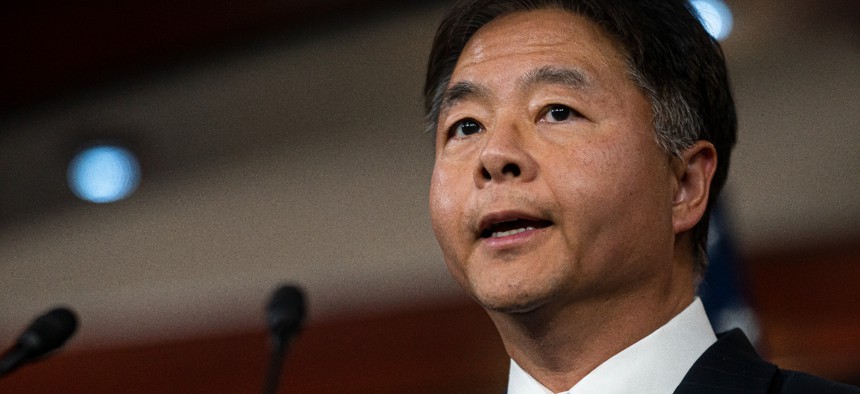Bipartisan bill proposes blue-ribbon panel to address AI risks, regulations

Rep. Ted W. Lieu, D-Calif., speaks during a press conference with incoming House Democratic Leadership at the U.S. Capitol on December 13, 2022 in Washington, D.C. Lieu has led a bipartisan effort to create a blue-ribbon panel for artificial intelligence.for Nathan Howard/Getty Images
Rep. Ted Lieu, D-Calif., is leading the effort to give Congress the expertise it needs to understand and possibly regulate the risks posed by artificial intelligence.
A bipartisan group of lawmakers from the House and Senate wants Congress to set up a blue ribbon commission to study artificial intelligence, with an eye to developing regulations or government oversight of the technology.
The push is led by Rep. Ted Lieu — a California Democrat who boasts an undergraduate degree in computer science — as well as Reps. Ted Buck, R-Colo., and Anna Eschoo, D-Calif. Sen. Brian Schatz, D-Hawaii, plans to introduce a companion bill in the Senate.
The National AI Commission Act would establish a 20-member commission with real-world experience in computer science or AI, civil society, industry, labor and government, with 10 members selected by Democrats and 10 by Republicans. Over the course of two-years, the commission would produce three reports focusing on current capacity at federal agencies for AI oversight and regulation, including suggesting new approaches and regulatory structures to govern the technology as needed.
“Artificial Intelligence is doing amazing things for our society. It can also cause significant harm if left unchecked and unregulated. Congress must not stay on the sidelines,” Lieu said in a statement. "However, we must also be humble and acknowledge that there is much we as Members of Congress don’t know about AI."
Under the bill, the commission would develop a "binding, risk-based approach" that includes identifying AI use cases that pose unacceptable risks as well as those that pose high, limited or minimal risks.
The idea of AI posing catastrophic risks to civilization is no longer limited to science fiction. Earlier this month, a group of computer scientists, researchers, academics, entrepreneurs and technologists — many of whom are working on developing cutting-edge generative AI applications at companies like OpenAI, Microsoft and Google — signed a statement saying that "Mitigating the risk of extinction from AI should be a global priority alongside other societal-scale risks such as pandemics and nuclear war."
As of June 20, Lieu is apparently the only elected official who added his name to the statement.
If the bill passes into law, the commission will have to produce an interim report, due six months after enactment, which proposes any urgent regulation or oversight necessary for AI. At the one-year mark, the commission will file its final report with recommendations for binding regulations. One year after the final report, the commission would release a follow-up report with any new findings and revisions to earlier recommendations.
“This bipartisan bill can advance U.S. innovation and competitiveness while bringing the tech industry to the table to examine how the U.S. can harness AI’s transformative potential," Jason Oxman, president and CEO of the Information Technology Industry Council, said in a statement.



